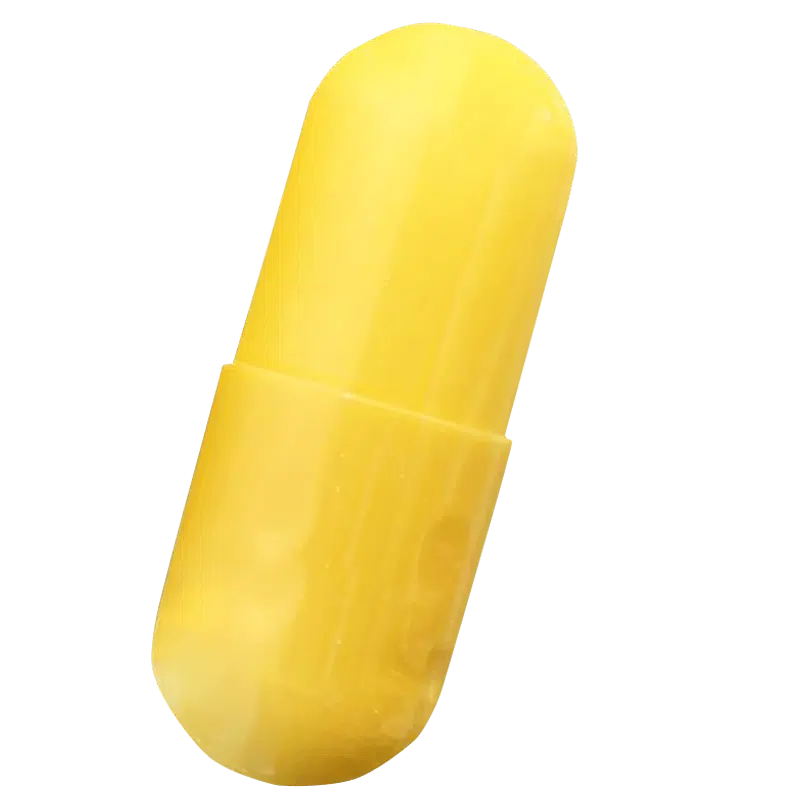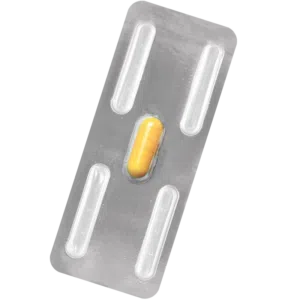Single-dose capsule to clear your infection.


Fluconazole is an effective treatment designed to deal with a number of fungal infections. It can be taken differently depending on the type of infection you have. For vaginal thrush, it’s taken as a single-dose capsule, which is usually powerful enough to clear your infection.
The active ingredient in the capsules, fluconazole, belongs to a class of medications called antifungals. They’re used to clear fungal infections, usually of the hair, skin, and nails. As well as vaginal thrush, antifungals are prescribed for ringworm, athlete’s foot, and fungal nail infections.
In one study, infections treated with fluconazole were found to have a ‘lower recurrence rate’ when compared with a topical treatment (one that is applied directly to the surface of your body, such as your skin). This means your infection could be less likely to return when you use fluconazole instead of other antifungal medications.
Just like the parts of our body where we commonly find them, fungal infections come in all shapes and sizes. They’re usually nothing to worry about and can be treated simply and easily. There are many different ways of contracting a fungal infection. Sometimes they can be caused by coming into contact with a fungus, but not always. In some situations, conditions inside the body or on the surface of the skin can provide optimal conditions for some fungi that already ‘lives’ on us to develop and thrive.
Fluconazole works by stopping a problem fungus from producing a substance called ergosterol. This is the glue that holds the fungi cells together. Without this glue, the fungus can’t sustain itself and the infection clears up.
Interestingly, there have been studies looking at combining Fluconazole with anti-cancer drugs to enhance the effect of it . (But this has been more to investigate the effects of the anit-cancer drug than Fluconazole.)
There are a whole host of fungi that our bodies come into contact with on a daily basis. Some might cause ringworm, some might cause athlete’s foot, and some live harmlessly on our skin for years. It’s when conditions are right for fungus to develop that an infection occurs.
Fungal infections like vaginal thrush are nothing to do with hygiene; they’re actually the result of too much yeast being present in the vagina. Some people feel irritated and uncomfortable when experiencing infections like thrush, so they think they need to shower or bathe more often. But it’s important not to wash excessively with perfumed soaps as that might further upset the PH balance of your skin, and make the infection worse. If you think you have a fungal infection, it’s best to seek treatment for it.
The dosage of fluconazole you take depends on what type of fungus is causing the problem. For vaginal thrush, the recommended dose is 150mg. It's usually taken as a single-dose capsule. This might be adjusted by your clinician if you have a particularly severe infection, or a persistent infection that hasn’t cleared up.
If you take Fluconazole but still have symptoms after finishing your course, you should ask your clinician for further advice.

How we source info.
When we present you with stats, data, opinion or a consensus, we’ll tell you where this came from. And we’ll only present data as clinically reliable if it’s come from a reputable source, such as a state or government-funded health body, a peer-reviewed medical journal, or a recognised analytics or data body. Read more in our editorial policy.
Always take Fluconazole as your clinician has told you to.
The manufacturer leaflet says that you should go back to your clinician for help if you don’t see improvement within one week . According to the summary of product characteristics, when you take Fluconazole it reaches ‘steady state’ in the body by day four or five . This is when a drug is being absorbed at the same rate it’s being cleared by your body, and is used to measure when a medication is working consistently. So while it only takes a few hours to be absorbed into your bloodstream, it’ll be working at close to optimum within a week.
If you miss a dose, it’s important to take that capsule as soon as you remember. If it’s nearly time for your next dose though, you should just skip the missed dose, but take your next capsule as normal. While it’s unlikely to cause you any harm, if you do accidentally take a double dose of Fluconazole, this might make you feel unwell. If this happens, you should seek medical assistance immediately.

How we source info.
When we present you with stats, data, opinion or a consensus, we’ll tell you where this came from. And we’ll only present data as clinically reliable if it’s come from a reputable source, such as a state or government-funded health body, a peer-reviewed medical journal, or a recognised analytics or data body. Read more in our editorial policy.
Have something specific you want to know? Search our info below, or ask our experts a question if you can’t find what you’re looking for.
Malignant Transformation and Treatment Recommendations of Chronic Hyperplastic Candidiasis- A Six-year Retrospective Cohort Study. Mycoses, 10.1111/myc.13371.
Repurposing the FDA-approved anticancer agent ponatinib as a fluconazole potentiator by suppression of multidrug efflux and Pma1 expression in a broad spectrum of yeast species. Microbial biotechnology, 10.1111/1751-7915.13814.
Fluconazole 150 mg Capsules - Patient Information Leaflet (PIL) - (emc).
Fluconazole 150 mg Capsules - Summary of Product Characteristics

Registered with GMC (No. 4624794)
Meet Daniel
Registered with GPhC (No. 2202465)
Meet Sanjeda
Registered with GPhC (No. 2070724)
Meet CraigDelivery, consultation, treatment. It’s all included in the price.
| Quantity | Starting from |
|---|---|
| 1 Capsule | £34.95 |
| Quantity | Starting from |
|---|---|
| 1 Pack | £41.95 |
| Quantity | Starting from |
|---|---|
| 20 g | £32.95 |
| Quantity | Starting from |
|---|---|
| 5 g | £30.95 |
| Quantity | Starting from |
|---|---|
| 1 Capsule | £36.95 |
| Quantity | Starting from |
|---|---|
| 1 Pack | £37.95 |
| Quantity | Starting from |
|---|---|
| 1 Pack | £33.95 |
| Quantity | Starting from |
|---|---|
| 20 g | £25.95 |
| 50 g | £36.95 Save £27.93 |
| Quantity | Starting from |
|---|---|
| 1 Capsule | £33.95 |
| Quantity | Starting from |
|---|---|
| 1 pack | £30.95 |
We know health, but you know you.
Our experts tell you what’s safe, but you decide what’s best.
Answer a few questions and tell us about yourself. Get tailored advice from our clinicians so you can choose better.

Choose your treatment and how often you have it delivered.

We know things change. It’s the nature of life. We’ll check in regularly to make sure your treatment is still right for you.
Pause. Change. Skip. Start again. Any time you like.
Always arrives on time and I’m kept informed of progress.
I have had it previously from my G.P so It worked as expected, extremely well. My problem is an accessing my G.P practice, they put ED well down their list of priorities. I found your service excellent, quick and efficient. I fully intend to continue using it
Shipping is speedy and the product is amazing.
Fast, slick service. Very easy to amend subscription when required.
All good.
Great service
Really helped me
Trusted service and great service - next day delivery and I can rely on them to send regularly.
Ordering was straight forward, tablets delivered promptly and well packaged, and instructions were clear, thanks.
100% recomended.Great service
Excellent service
Excellent delivery. Can’t fault.
Quick and efficient service, delivered discreetly the next day. Thank you.
Effective
Great service, no wait time
Great
Quick assessing for medicine suitability. Quick delivery and good communication throughout.
Straightforward and quick service!
Good however communication could sometimes be better
Easy and good procedure to get treatment
Excellent product
Excellent service!!! Ordered what I needed sent a picture of my prescription and the parcel arrived the next day!!! Will definitely order again and have recommended to others!!!
Fast shipping
Very quick service all round
So quick and simple. Recommend
Great
Very convenient hassle free service.
Easy to use good communication and fast shipping
Great service
Efficient no issues re delivery
Fabulous service
Brilliant service. Not a bad word to say!
It was fast, professional and it's the right med for what I selected in there.
This review requires content. Oh well..
Great service, quite effortless.
Top notch
Brill service
N/a
Excellent service quick and easy to use
Fast and exact order
Superb service and quick delivery 10/10
Excellent service
Thank you for fast delivery
Shipping is extremely quick and satisfiying
Good stuff
Good service
Great fast delivery
Vaginal thrush: Here are some other options.
Combined thrush treatment that uses two medications to clear vaginal thrush.
Soothing relief of itching and irritation caused by thrush.
Internal cream in an easy to use applicator, to soothe vaginal thrush.
Powerful single dose thrush treatment. Branded version of fluconazole.
Branded clotrimazole tablet that effectively treats vaginal thrush infections.
Effective tablet treatment for vaginal thrush infections.
Antifungal treatment to treat vaginal thrush and help stop it returning.
Vaginal thrush cream that treats internal and external symptoms.
We're making healthcare more about you. Sign up to our newsletter for personalised health articles that make a difference.
Disclaimer: The information provided on this page is not a substitute for professional medical advice, diagnosis, or treatment. If you have any questions or concerns about your health, please talk to a doctor.
We couldn't find what you're looking for.
Here's everything we treat. Or, if you're looking for something we don't have yet, you can suggest something.
If there’s a particular treatment or condition you’re looking for, tell us and we’ll look into it for you.
Submit your question here, or tell us if you’ve found an issue on our site.
We’ll get back to you very soon. We aim to respond to all queries in one working day.
You’re signed up to our newsletter. Keep an eye on your inbox for our latest update.
By clicking 'Subscribe now' you're agreeing to our Privacy Policy.
We’ve sent you an email asking you to confirm your email address.